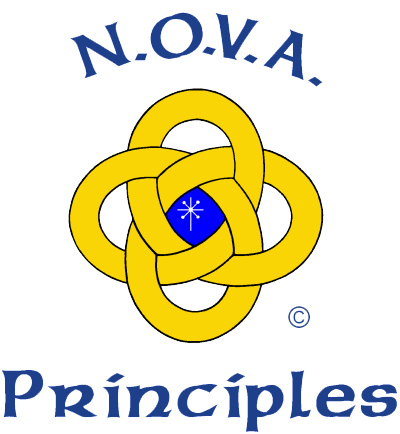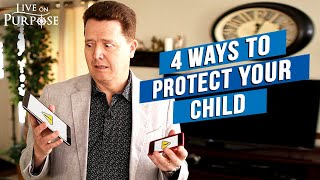It's a risky world out there, especially on the internet. I have four clear pointers for you today on how to protect your child while on the internet. Before we get into those four points, let's talk about risk briefly. There are three things that you can do about risk. The first thing you might consider is to ignore the risk. Just ignore it. Pretend like it's not there. This would be like trying to cross a busy street to get to lunch. And as you try to cross the street, you decide, “Oh, there's a lot of traffic. I better not look.” Close your eyes and hope for the best. What's going to happen? If you ignore risk, you increase the danger. And I guarantee you, the Internet can be a very, very risky place. So, I'm not sure we like that particular option.
Secondly, how about avoiding the risk altogether? So, instead of ignoring it, we're going to avoid it. Nope, not going to go. Too dangerous. Well, you don't get to have lunch if you don't cross the street, in the example that I shared. And, if we avoid the risk, we can close our children off from all kinds of opportunities that are good and wholesome in principal centric, that are there on the Internet. Including stuff on this channel. So, I don't like our choices so far, how about you? Ignoring risk, increases danger. Avoiding risk, decreases the possibility of a payoff. We needed a third option.
What if we take a little walk about a half a block that way on the busy street. We come to a crosswalk. We push the button. We wait for the signal and when the signal gives us a green light… No, we don't go yet. We look both directions, don't you? I hope you do. I do. Because it doesn't eliminate the risk entirely. I don't think we can. But what that does is it brings the risk down to a manageable level. So, we're going to title this one, “Manage the Risk.” It's like going to the crosswalk.
There are four steps that I am going to share with you next about managing the risk for your children on the Internet. In the interest of managing the risk, let's go to the obvious one first. Number one, supervise. Provide a chaperone for your children in their internet activities. Now, this might vary depending on the moral development or stage of development for your kids. If you're not sure what I'm referring to, check out my blog post, Teaching Kids Responsibilities. That will go over the basic philosophy that I'm referring to right now. You keep your eyes on your kids. Most internet predators are older than your children. Is that a little scary? But they don't always present themselves as being older. They might try to be a peer or a friend or someone who's the same age. And your kids don't know because they're interacting with them on some kind of a chat or a game platform or whatever it is. You supervise that activity because you want to see what's going on and that way you can help to keep them safe. It's just like the crosswalk folks. So, you want to keep that computer in a public, visible area of your home. Let's stay away from bedrooms, let's stay away from closed doors. Because you need to have your eyes on your little ones as they are online.
One of the most important things we can do is to teach our children. So, pointer number two for you on keeping our kids safe online is to teach them to keep private information private. You don't go out to the mall and broadcast your bank account information to everybody in the mall. In a similar way, you don't go out and broadcast your specific address or your date of birth or your mother's maiden name on the internet. Because these are the kinds of information that people can use to exploit or to victimize other people on the internet. We teach our children that if somebody asks for specific identifying information from them online, that they don't give it out. It's a pretty simple step but a very important one.
Pointer number three, you are the parent. Be the parent. In your browser and on some of the platforms that are available to your children online, there's something called parental controls. Wow! What an idea. So, you get to go in and set those controls and those filters and those parameters around content that you feel is appropriate for your child. Be the parent. Use the filtering software. Use the parental controls but do not rely exclusively on those filters. We're not negating tip number one which is to keep your eyes on them. Provide the supervision in the chaperoning.
My fourth pointer for you today is an elaboration of the second. We're going back to teaching but I want to specifically suggest that we teach correct principles which will empower our children to start adopting a form of self-government so they can operate according to their own moral compass. This provides prevention for all of the risky behaviors that they could be involved with. When I think of prevention, I think of a poem written by Joseph Malins, clear back in the 1800s. And here's how it goes.
‘Twas a dangerous cliff, as they freely confessed,
Though to walk near its crest was so pleasant;
But over its terrible edge there had slipped A duke,
and full many a peasant;
So the people said something would have to be done,
But their projects did not all tally.
Some said, “Put a fence around the edge of the cliff;”
Some, “An ambulance down in the valley.”
But the cry for the ambulance carried the day,
For it spread through the neighboring city,
A fence may be useful or not, it is true,
But each heart became brimful of pity
For those who slipped over that dangerous cliff;
And the dwellers in highway and alley
Gave pounds or gave pence, not to put up a fence,
But an ambulance down in the valley.
Then an old sage remarked, “It’s a marvel to me
That people give far more attention
To repairing the results than to stopping the cause,
When they’d much better aim at prevention.
Let us stop at its source all this mischief,” cried he.
“Come, neighbors and friends let us rally:
If the cliff we will fence we might almost dispense
With the ambulance down in the valley.”
Better guide well the young than reclaim them when old,
For the voice of true wisdom is calling:
“To rescue the fallen is good, but ‘tis best
To prevent other people from falling.”
Better close up the source of temptation and crime
Than to deliver from dungeon or galley;
Better put a strong fence ‘round the top of the cliff,
Than an ambulance down in the valley!
A big shout-out to N.O.V.A. Principles Foundation. You can connect to N.O.V.A. Principles at Novaprinciples.com. They are some of the best fence builders in the industry. I think it's important to do what we can to prevent our kids from getting over the cliff into these risky behaviors. And you can do this too.

